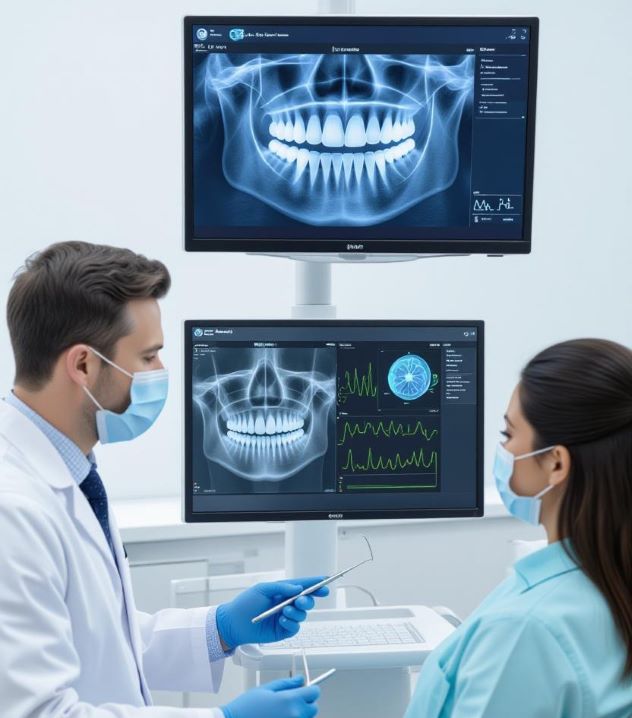Tag Archives: oral health
Early Detection, Healthier Lives: How AI in Dentistry Protects Your Well-being

Oral health can reveal critical clues about overall well-being. Tiny changes in gum tissue, enamel, or the soft lining of the mouth often signal larger health issues. Detecting these signs early is essential. Advances in artificial intelligence are helping dentists identify problems sooner, improving patient outcomes and reducing treatment costs.
Leading experts like trusted NYC dentist Dr. Nicole Khalife are embracing AI to transform patient care. By analyzing thousands of images and clinical data points, AI algorithms detect early signs of oral cancers, precancerous lesions, and gum disease faster than human eyes alone. This rapid detection can mean the difference between simple treatment and complex, invasive procedures.
How AI Sees What We Might Miss
AI systems are trained to recognize patterns invisible to the human eye. Tiny color variations, subtle tissue changes, and early decay can be flagged immediately. These systems cross-reference patient history, genetic risk factors, and lifestyle data, helping dentists make precise recommendations.
For example:
- AI can highlight suspicious lesions during routine check-ups, prompting timely biopsies.
- It can detect early gum recession and bone loss, helping prevent severe periodontal disease.
- Machine learning algorithms predict which patients may be at higher risk of oral cancer, allowing for proactive monitoring.
Improving Survival and Reducing Costs
Early detection directly impacts survival rates for oral cancer patients. The American Cancer Society reports that the survival rate drops dramatically when diagnosis is delayed. AI-assisted screenings help identify issues before symptoms appear, which can lead to simpler and less expensive treatments.
Furthermore, preventing advanced gum disease through early AI detection reduces the need for surgeries, bone grafts, and dental implants. Patients save money and avoid extended recovery periods.
AI and Personalized Care
AI doesn’t replace dentists; it enhances their expertise. By processing large datasets, AI offers insights that are difficult for humans to spot consistently. Dentists can then create personalized care plans based on risk assessment, genetics, and oral hygiene habits. Patients receive targeted advice for diet, oral care, and lifestyle adjustments.
For instance, someone identified as high risk for gum disease might receive a customized plan emphasizing anti-inflammatory foods, precision flossing techniques, and follow-up imaging, improving their long-term oral health.
Building Patient Confidence
Knowing your dentist uses AI can provide peace of mind. Patients often feel more secure when advanced technology assists in diagnosis. Seeing lesions or decay detected early fosters trust and encourages regular dental visits. Early intervention improves not just oral health, but overall quality of life.
The Future of AI in Dentistry
AI is evolving beyond detection into prediction and prevention. Future systems may integrate wearable devices, saliva tests, and genetic markers to alert patients before dental issues arise. Imagine a world where your dentist receives an alert about potential gum disease weeks before any symptoms appear, allowing for timely preventive care.
By combining technology with human expertise, AI is creating a new standard for proactive oral healthcare. Patients enjoy healthier smiles, less invasive treatments, and reduced costs, making routine dental visits more meaningful and effective.
READ ALSO: What Your Dentist Wants You to Know About Oral Health
Conclusion
Artificial intelligence is reshaping how dentists approach oral health. Early detection of oral cancers, gum disease, and other conditions improves survival rates and quality of life. With the guidance of professionals like trusted NYC dentist Dr. Nicole Khalife, AI is helping patients take control of their health, creating a future where early intervention leads to healthier, brighter smiles for everyone.
What Did Your Dentist Say About Mouthwash?

Maintaining good oral health is important to ensure that your teeth and gums stay healthy. One way to achieve this is by using mouthwash as part of your oral hygiene routine. However, there has been some debate about the effectiveness of mouthwash, and many people are unsure whether it is necessary or not. So, what did your dentist say about mouthwash? Let’s dive in and explore the topic further.
Read also: The Distinction Between Well-being and Health
The Benefits of Using Mouthwash
Mouthwash is an antiseptic solution that can be used to help kill germs in the mouth. It can also freshen your breath and help prevent tooth decay and gum disease. Many dentists recommend using mouthwash as part of a good oral hygiene routine, in addition to brushing and flossing regularly.
Mouthwash can be particularly useful for people who have braces or other orthodontic appliances, as it can help to remove food particles that may be stuck between the teeth and wires. Additionally, mouthwash can help to reduce the risk of cavities in hard-to-reach areas, such as the back of the mouth.
Different Types of Mouthwash
There are several different types of mouthwash available on the market, each with its own unique benefits. Some mouthwashes contain fluoride, which can help to strengthen teeth and prevent cavities. Others are designed to whiten teeth, freshen breath, or reduce sensitivity.
It is important to choose a mouthwash that is right for your individual needs. If you are unsure which type of mouthwash to use, consult with your dentist, who can recommend a product that is tailored to your specific oral health needs.
Using Mouthwash Correctly
To get the most benefit from using mouthwash, it is important to use it correctly. Start by brushing and flossing your teeth as normal, then rinse your mouth with a small amount of mouthwash. Swish the mouthwash around your mouth for at least 30 seconds, then spit it out.
Avoid eating or drinking anything for at least 30 minutes after using mouthwash, as this can dilute the effects of the solution. Additionally, do not swallow the mouthwash, as this can be harmful if ingested in large quantities.
The Potential Risks of Using Mouthwash
While there are many benefits to using mouthwash, there are also some potential risks to be aware of. Some mouthwashes contain alcohol, which can be drying to the mouth and may increase the risk of oral cancer with long-term use. However, there are many alcohol-free types of mouthwash available on the market, which can be a safer alternative for people who are concerned about this risk.
Additionally, some people may be allergic to certain ingredients in mouthwash, so it is important to read the label carefully before using a new product. If you experience any symptoms of an allergic reaction, such as swelling or difficulty breathing, stop using the mouthwash immediately and seek medical attention.
Conclusion
So, what did your dentist say about mouthwash? In general, most dentists recommend using mouthwash as part of a good oral hygiene routine. Mouthwash can help to kill germs, freshen your breath, and prevent tooth decay and gum disease. However, it is important to choose the right type of mouthwash for your individual needs and to use it correctly to get the most benefit.
If you have any questions or concerns about using mouthwash, talk to your dentist, who can provide you with more information and recommend a product that is right for you.
The Impact Of Oral Health To Our Body

The jaw cracks and the neck is tense – a feeling with which many people wake up in the morning. And the reason why more and more people are using a splint against teeth grinding for sleeping. Almost everyone has heard that crunching can trigger tension and headaches. What is less well known is that other dental problems can also hurt the rest of the body.
The dental team from Sky Dental explained to us what influence the health of our teeth has on that of our body and why gum inflammation plays a major role in this.
Problems with the teeth
Caries are still the number one dental disease in Germany. They and gingivitis, the so-called gingivitis, arise from a lack of dental hygiene. A disease independent of dental hygiene is tooth erosion. This is the destruction of the tooth substance – triggered by the consumption of acidic foods such as soft or energy drinks, but also by regular heartburn. These diseases can be treated well by the dentist and usually have only limited consequences for our general health. The worse effects on the body have periodontitis.
What is periodontitis?
Periodontitis is an inflammation of the periodontium. This is the tissue around the tooth. Periodontitis is an excessive immune response of the body. If the body wants to ward off unwanted bacteria in the mouth, inflammation of the gums is the result. In contrast to gingivitis, however, periodontitis attacks the bone in which the teeth are embedded. This creates so-called gum pockets around the tooth. Bacteria accumulate in them, which then trigger further inflammation and thus damage the periodontium.
From the mouth to the whole body – effects of periodontitis
The bacteria of periodontitis and also the inflammatory reaction is not limited to the mouth. Instead, both enter the entire body via the bloodstream and can cause immense damage there. So you can say:
“Sick periodontium, sick person”
ALSO READ: Can You Really Be Healthy While Being Obese?
Thus, experts have found that there is even a link between periodontitis and Alzheimer’s. In Alzheimer’s disease, inflammatory deposits in the brain occur, causing nerve cells to die. This so-called neurodegeneration can be initiated by periodontal bacteria.
In addition, they can also trigger inflammation of the vessels. Consequences of this can be various cardiovascular diseases, such as high blood pressure, calcification of the arteries, disturbances in the blood circulation of the arms and legs, to a heart attack.
In pregnant women, periodontitis can even lead to premature birth. The reason for this is that the bacteria and the inflammatory mediators they trigger enter the uterus via the bloodstream and can thus trigger premature birth.
In addition, the bacteria can cause pneumonia in people with a weak immune system or bedridden people, among other things.
For this reason, these groups of people should pay particular attention to adequate oral hygiene and go to the dentist as early as possible to exclude or treat possible periodontitis.
Diabetes – a relationship of a special kind
There is one disease that has a special effect on periodontitis: diabetes. In contrast to high blood pressure, Alzheimer’s, etc., the two diseases influence each other. “This goes both ways,” explains the expert. “A lack of dental hygiene can promote diabetes. And if you have diabetes, get periodontitis faster.” But how does it work? The bacteria that enter the bloodstream through periodontitis inhibit the important hormone insulin. In diabetes, on the other hand, inflammatory bacteria are released, which increases periodontitis.
However, the two diseases also affect recovery. It has been proven that if periodontitis improves, diabetes usually does the same. And if the blood glucose levels of a diabetic patient improve, this has a healing effect on his diseased gums.
How to recognize periodontitis
Treating periodontitis is complicated – especially if it is already advanced. That’s why you should quickly visit your dentist for these symptoms:
- Bleeding gums: If something is wrong with your gums, the easiest way to recognize it is bleeding gums. Usually, this goes away after a few days and more concentrated brushing. In the case of periodontitis, however, not.
- Bad breath: If the body fends off unwanted bacteria with gingivitis, the resulting pus leads to a somewhat sweet bad breath, which can not be brushed away.
- Loosened teeth: With advanced periodontitis, the periodontium is so damaged that even teeth can loosen.
Many dental problems can be recognized by toothache or gum pain. With periodontitis, however, pain often occurs hardly or not at all. That’s why it’s important to take the other symptoms seriously and go to the dentist earlier than usual.




